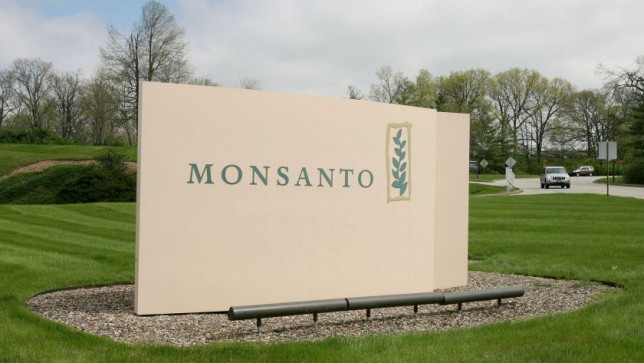Monsanto announced Wednesday that sales in the company’s agricultural productivity segment, which includes its probable carcinogen Roundup herbicide, fell 34 % to $820 million. Monsanto’s shares fell over 2% as a result.

The Biotech giant also said Wednesday that it now plans to cut a total of 3600 jobs, or about 16 % of its global work force, through fiscal 2018, and expects to record $1.1 billion to $1.2 billion in restructuring charges.
In October, Monsanto said that it would slash 2,600 jobs worldwide as part of a global restructuring effort to cut costs and boost savings, including consolidating some business and research centers and getting out of the sugar cane business, Reuters reported.
Monsanto has been struggling for investor confidence following the announcement in March 2015 that the World Health Organisation’s cancer agency had declared the world’s most widely used weedkiller – glyphosate – a “probable human carcinogen”.
Glyphosate is the base of Monsanto’s whole business model;
a) the glyphosate-based herbicide ‘Roundup’ is Monsanto’s leading product.
b) Roundup is the herbicide that the majority of Monsanto’s GM crops are designed to be grown with.
Monsanto stated; “Net sales for the quarter decreased over the prior year’s first quarter to $2.2 billion. Gross profit on an as-reported basis for the 2016 first quarter also decreased over the prior year period to $901 million. As expected, the decline in the quarter is due to weaker foreign currencies, glyphosate pricing and lower corn volumes in Latin America.
With the anticipated continuation of several global and industry headwinds that include the recent currency devaluation in Argentina, Monsanto expects full-year ongoing EPS guidance to be at the lower half of the range of $5.10 to $5.60.”


















What is increasing is the amount of RoundUp [glyphosate] being used to terminate the life of non-GMO, non-organic grains. [wheat, rye, barley, etc.] We can no longer eat.non-organic bread, etc. Most of the increase of “Celiac Disease” is actually due to the addition of glyphosate in non-organic bread, buns, donuts, cakes, etc. A year ago we all had become very sick until we switched to organic bread, etc. It has been ten years since we learned about GMOs and how to avoid them.
I have been reading how wheat fields in USA are completely washed in roundup especially before harvest. They do not have to have the bt dna. That much roundup is used to ensure a bigger crop overall and not by wise means.
In 2012 after seeing the rat study, I gave up all corn, soy, canola and started to feel more energy. The following year, I gave up wheat. I am not going to go on and on about how great I feel… but I do. I did add other foods like beans, seeds and nuts.
DianneP,
I’m the 4th generation on an organic farm that has been organic for 20 years and no roundup was ever sprayed on our farm. But I do have many acquaintances that are conventional wheat growers and here in the continental USA there is very little wheat or other small grains that are sprayed with glyphosate as a desiccant as you describe. It is more prevalent on the high plains of western Canada because of their shorter growing season but here in the lower 48 states it makes such small difference to the wheat yield or quality that its not economically viable for the average large farm to spend the time and money to spray thousands of acres of wheat just before harvest. Besides the big sprayer wheels smash some harvestable crop while doing it. On GMO crops glyphosate is sprayed when it is quite young before it canopies over and so then the wheel tracks have time to grow over and yield a crop in that space.
The rumors about all conventional wheat being soaked in glyphosate pre-harvest are baseless and were propagated largely be a very popular blogger a year or two ago who wouldn’t even listen to the conventional farmers who wrote one after the other stating that they never sprayed roundup on their wheat. She would just call them liars.
I would like to see glyphosate eliminated in the USA. But I also would like this false rumor about all wheat being sprayed with it pre-harvest also eliminated.
Dwight, I understand what you wrote about wheat and glyphosate. I would suggest that you look into 2-4 D being sprayed on wheat prior to harvest to defoliate the plant. One customer service person replied to my question by stating 2-4 D was a ‘growth stabilizer!’ 2-4 D was the defoiliant used in Agent Orange in Vietnam, and those of us of a ‘certain age’ know what happened after that.
Hey, best news I’ve heard all year! But let’s treat it as ‘starting as we mean to go on’, shall we? Let’s see if we can get rid of the remaining 66% by the end of the year!
Has anyone noticed the NEW Monsanto TV ad? They will fight with everything they have. We all agree that the end of Monsanto would be wonderful. Their history suggests otherwise. I mostly fear Monsanto will exert as much pressure as they can to get the probable carcinogen label retracted by the WHO. The best news following the WHO was Seralini’s lawsuit in France. His rat study using 200 rats (same as Monsanto used for 90 day trials fed the same bt corn from Canada resulted in very bad news for Monsanto, enough for the power Monsanto had to get Seralini’s 2012 study retracted. Seralini has been completely exonerated and that is terrible for the integrity of published scientific studies. In other words if we cannot trust corporations managing world political will against the masses (people), who and what can save us? Monsanto will only give in if their product does not sell and class action lawsuits against roundup continue to grow and pubic opinion goes against chemical companies generally.